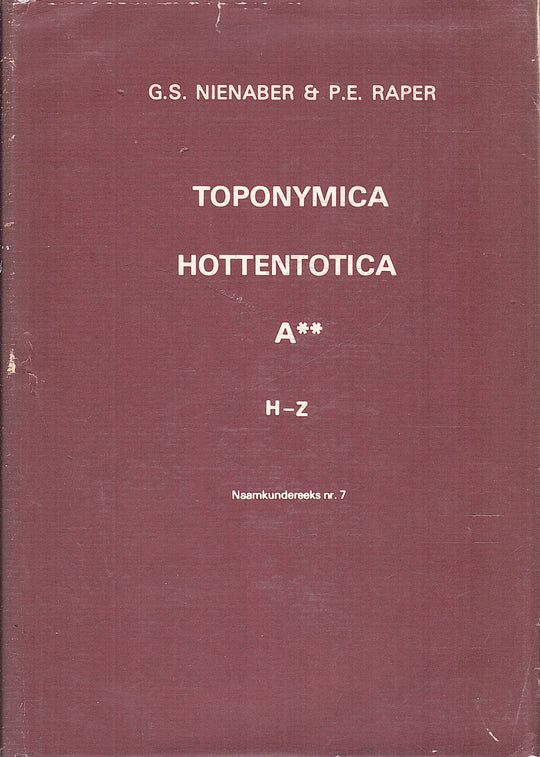Outjo
Hartmann and also sprigade fisel form the parent of the name, T.w. Tsuob, repeated by Schubert, knew and preserved, and it supports the distraction given by Krenz. Mr Krenz that the foregoing, writes in 1976 hereby 'My cousin Schubert was deceived by the 6, and also Mr Alberts. 'O' Hinter adjektives Ist nicht verninently without storming: Tsuo = Schlecht, Tsueo = Ohne Schlechigkeit. ES is in Betracht Zu Ziehen, CASS 'Tsuo' Fiirchet War as 'Fieberplatz' Und Deswegen Niemals as Wohnort (Permanent) in Frage comb '.
About this item
Identifier
2556_SKCPN
Title
Outjo
Alternative Title
Outjo
Georeference Sources
S 2016
Is Part Of
longitude
16.5
latitude
-20.5
Measurement Accuracy
50 km radius
Source
eng
Hahn TH I 879 Kaart 'Outyo'. Sprigade-Moisel 1904 Warsk 'Outjo (Tsuob)'. Hartmann 1904 Kaart 'Outjo (Tsuob)'. Arbeief, Windhoek S.J. 'Outjo, Waarskynik's plek op the small terrace '.' Krenz 1970 Mitt 11/4 3 'Outjo: Here the original HE5 ╪ AO-DAMA-NAMA 'TSUO' would be prepared. The word 'Tsuo' driots everything we would call as 'Bose, Libel, Bad'. Like an old mountain dama, whom I asked about the meaning, said: Tsu Ge a Tsu (bad means bad), Xawe Tsuob Xa Tsu di Mies Tsin a Fkaoi: 'But talk about Tsuob (Outjo) as bad, is still too little'. The man had to make Bose drives ... The Herero set only one 'O' to the Hei- ǀǀ kum word 'Tsuo'; The German protective rule took over this Otsou (as a clang-going, one must accept), from which officially outjo would '. SESA 1973 8 409 'There is Considerable Uncertainty About The Origin of the Name. The Place Was Previously Known in Nama As IMAP, But Since It Operten Occupied by Herero and Seldom by Namas, IT Became Known As Outjo, Probably A Herero Word Associated with the Terraces, a Geographical Feature Near BY. Others Associate It With Sweetness, Refring to the Honeycombs Found in The Rock Formations of the Terraces, Or to 'Sweet Waters', Fountains Springing There ... 'Albert's PPH 1973 Boer Vraelys' Outjo, Otjo Betke's 'Niks Sleg never', en OOK: 'N Kaal, Mooi Duik's OP Boesman. OP Hererotaal Betken Outjo 'Diep Grot', the DieP Grot is Opl Een van the Rantjies Naby Outjo-Dorp '. Schubert EB 1973 Senior Klerk, Department of Waterwese, Windhoek, Vraelys en Letter 'Outjo Het the Naam in Nama Tsu-Whether, pray 'Plek Special Ewel' ... The Speech is Vir My Onbekend'. Krenz FK 1974 Boer Aantekening 'Tsuo = Sleg. Tsuob = Sampled Plek, Omat The Mens (Saa en Dama) Aan Malaria en Sewartwater Giften Het. The Ovaherero Het Siffs never Hulle Beeste Daar Laat Suip never '.
afr
Hahn Th i 879 kaart 'Outyo'. Sprigade-Moisel 1904 Kriegsk 'Outjo (Tsuob)'. Hartmann 1904 kaart 'Outjo (Tsuob)'. Argief, Windhoek s.j. 'Outjo, waarskynlik ‘die plek op die klein terrasse'.' Krenz 1970 Mitt 11/4 3 'Outjo: hier würde der urspriingliche Heikum- ╪ Ao- Dama-Nama ‘Tsuo’ hererosiert. Das Wort ‘Tsuo’ driickt alles aus, was wir als 'bose, libel, schlecht' bezeichnen wiirden. Wie mir ein alter Bergdama, den ich nach der Bedeutung fragte, sagte: Tsu ge a tsu (schlecht bedeutet schlecht), xawe tsuob xa tsu di mies tsin a fkaoi: 'aber von Tsuob (Outjo) als schlecht zu reden, ist noch zu wenig’. Der Mann musste bose Er- fahrungen gemacht haben...Die Herero setzten dem Hei-ǀǀkum-Wort 'tsuo' nur ein 'O’ vor; die deutsche Schutzherrschaft ubernahm dieses Otsou (als klangvoller, muss man annehmen), woraus amtlich Outjo würde'. SESA 1973 8 409 'There is considerable uncertainty about the origin of the name. The place was previously known in Nama as Imap, but since it was often occupied by Herero and seldom by Namas, it became known as Outjo, probably a Herero word associated with the Terraces, a geographical feature near by. Others associate it with sweetness, referring to the honeycombs found in the rock formations of the Terraces, or to 'sweet waters’, fountains springing there...' Alberts PPH 1973 Boer Vraelys 'Outjo, Otjo beteken 'Niks sleg nie’, en ook: 'n Kaal, mooi duik’ op Boesman. Op Hererotaal beteken Outjo 'Diep grot’, die diep grot is op een van die rantjies naby Outjo-dorp'. Schubert EB 1973 Senior Klerk, Departement Waterwese, Windhoek, Vraelys en Brief 'Outjo het die naam in Nama Tsu-ob, beteken ‘Plek sonder euwel'...Die rede is vir my onbekend'. Krenz FK 1974 Boer Aantekening 'Tsuo = sleg. Tsuob = slegte plek, omdat die mense (Saa en Dama) aan malaria en swartwater gesterf het. Die Ovaherero het seifs nie hulle beeste daar laat suip nie'.
Description
eng
Hartmann and also sprigade fisel form the parent of the name, T.w. Tsuob, repeated by Schubert, knew and preserved, and it supports the distraction given by Krenz. Mr Krenz that the foregoing, writes in 1976 hereby 'My cousin Schubert was deceived by the 6, and also Mr Alberts. 'O' Hinter adjektives Ist nicht verninently without storming: Tsuo = Schlecht, Tsueo = Ohne Schlechigkeit. ES is in Betracht Zu Ziehen, CASS 'Tsuo' Fiirchet War as 'Fieberplatz' Und Deswegen Niemals as Wohnort (Permanent) in Frage comb '.
afr
Hartmann en ook Sprigade-Moisel het die ouer vorm van die naam, t.w. Tsuob, herhaal deur Schubert, geken en bewaar, en dit steun die afleiding wat deur Krenz gegee is. Mnr Krenz wat die voorgaande geleës het, skryf ter verdere verduideliking in 1976 hierby 'My neef Schubert is mislei deur die 6, en ook mnr Alberts. ‘O’ hinter Adjektiven ist nicht verneinend sondern verstarkend: tsuo = schlecht, tsueo = ohne Schlechtigkeit. Es ist in Betracht zu ziehen, dass ‘Tsuo’ gefiirchtet war als ‘Fieberplatz’ und deswegen niemals als Wohnort (permanent) in Frage kam'.
page start
983




